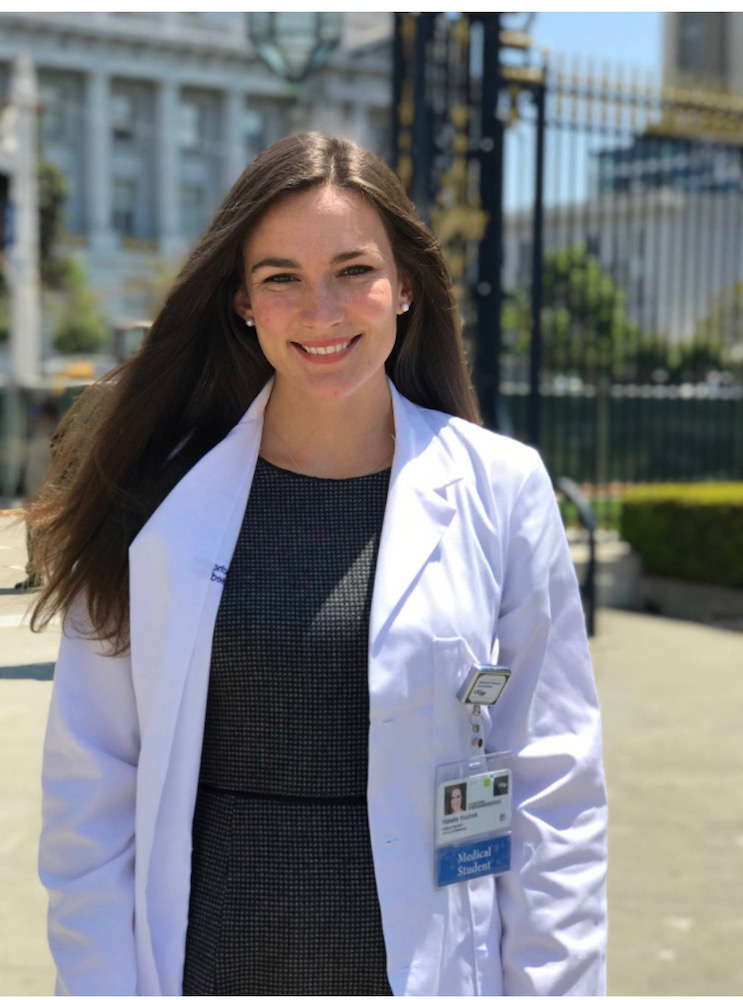Natalie Kucirek graduated from Piedmont High School in 2013 and went on to study Molecular and Cellular Biology at UC Berkeley. She is now a third-year medical student at UCSF. Although UCSF removed third-year medical students from clinical care in mid-March due to coronavirus, Kucirek engaged in a project to connect patients to loved ones at UCSF called Connecting During COVID, and a Mission District-based COVID-19 testing study, Unidos en Salud.
What drew you to the medical field?
I first became interested in medicine after taking a hands-on anatomy class during a summer camp growing up. Pursuing medicine satisfies my curiosity to learn how the body works, both at a cellular and holistic level. It also allows me the privilege to accompany others in universal but profound life experiences, from the birth of a child to critical illness and death. Medicine is ever-changing and multifaceted, with opportunities to teach, serve others, and research, which I believe will lead to a satisfying career.
What do you do as a third-year medical student and how did that change as a result of COVID?
Before COVID, I was working full time in a clinical setting. In mid-March UCSF made the decision to remove us from the clinical setting. We are currently participating in remote clerkships, which aim to cover as much of the medical knowledge we need to be successful doctors as possible before we return to the clinical setting. These “virtual rotations” include live Zoom teaching sessions, telemedicine, clinical problem solving, and self-study in preparation for at-home exams. UCSF plans to have us go back to the clinical setting starting in July.
Describe your work on the Unidos en Salud study.
I was working as a lab volunteer for COVID testing in the Mission District on April 25 and 26. I collected blood samples for the virology test and nasal swab for viral PCR (polymerase chain reaction) testing. The virology test tells us if the patient was previously infected with COVID and the viral PCR test shows if the patient is actively infected.
What was the most surprising or interesting part of working for Unidos en Salud?
It was moving to see how willing the community was to come out, especially kids. We were testing kids ages four and older. It was inspiring to see the bravery of the young kids because the tests can be very uncomfortable. The study was put together by community organizers in the Mission District after data came out that COVID was disproportionately hitting Latinx people. The community organizers partnered with UCSF to understand who was getting affected by COVID in the Mission. It was inspiring to see the community come together through the combination of community organizers, UCSF staff, activists and students.
Describe your involvement in Connecting During COVID.
The Internal Medicine residents had the idea to solicit tech companies to donate iPads because UCSF’s “no visitors” policy had negative impacts on patient care. The residents then recruited medical students to work on the project. I got involved through my COVID elective course. UCSF put together a COVID elective for medical students which gave students different opportunities to get involved in different projects. I was responsible for creating the service in hospitals which connect patients to loved ones on donated iPads.
What was the most surprising or interesting part of your work on Connecting During COVID?
It was touching to see the moment where these patients got to see a loved one’s face — a lot of them were overcome with emotion. It was a very powerful reminder for us of how important relationships are to the healing process and how much is lost when we can no longer experience those relationships in person. Patients had a raw emotional response which reminded us of how important it is for patients to feel supported and how the hospital can be a lonely and isolating place.
What are some of the most useful things Piedmonters could be doing right now to help frontline medical workers?
Piedmonters should continue to practice social distancing, wear masks and continue to follow county and state guidelines. It is important to continue to limit spread, so frontline workers do not become overwhelmed. It is also important to be looking into data on COVID. In Alameda County there are stark racial and ethnic disparities. Lots of workers of lower income are not able to shelter in place or work remotely which puts them at high risk. I would say it’s critical to figure out ways to support those communities.
Is there anything you want Piedmonters to know as they start to go out more?
Piedomonters should continue following county and state guidelines as much as possible. We know how hard it is to be isolated from each other, but it is important to continue to follow guidelines.

What an impressive woman !
She is an inspiration to us all. Natalie is an example of what hard work can accomplish. Hats off to her parents for all their support…..be proud!